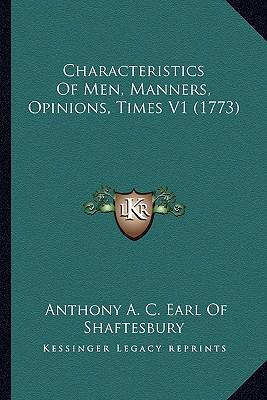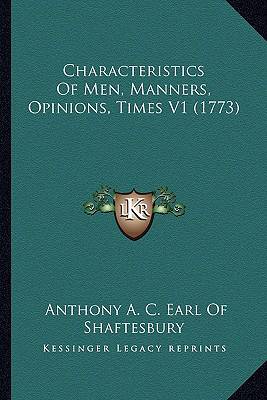
- Afhalen na 1 uur in een winkel met voorraad
- Gratis thuislevering in België vanaf € 30
- Ruim aanbod met 7 miljoen producten
- Afhalen na 1 uur in een winkel met voorraad
- Gratis thuislevering in België vanaf € 30
- Ruim aanbod met 7 miljoen producten
Zoeken
Characteristics of Men, Manners, Opinions, Times V1 (1773)
Anthony Ashley Cooper Shaftesbury
Paperback | Engels
€ 47,45
+ 94 punten
Uitvoering
Omschrijving
""Characteristics of Men, Manners, Opinions, Times"" is a philosophical work written by Anthony Ashley Cooper, the 3rd Earl of Shaftesbury, and first published in 1711. This volume is the first of a two-volume set, originally published in 1773. The book is a collection of essays that explore various philosophical and ethical ideas, such as the nature of morality, the role of reason in human behavior, and the relationship between individual freedom and social order. Shaftesbury argues that human beings have an innate sense of morality and that this sense can be cultivated through education and social interaction. In addition to his philosophical musings, Shaftesbury also offers commentary on the social and political climate of his time, including the rise of commercialism and the decline of traditional values. He criticizes the materialism and selfishness of contemporary society, while also advocating for individual liberty and the importance of cultural and intellectual pursuits. Overall, ""Characteristics of Men, Manners, Opinions, Times"" is a complex and thought-provoking work that offers insights into both the philosophical and social issues of the early 18th century. It remains a significant contribution to the history of philosophy and political thought.Contains A Letter Concerning Enthusiasm; Sensus Communis, An Essay On The Freedom Of Wit And Humor; Soliloquy, Or Advice To An Author.This scarce antiquarian book is a facsimile reprint of the old original and may contain some imperfections such as library marks and notations. Because we believe this work is culturally important, we have made it available as part of our commitment for protecting, preserving, and promoting the world's literature in affordable, high quality, modern editions, that are true to their original work.
Specificaties
Betrokkenen
- Auteur(s):
- Uitgeverij:
Inhoud
- Aantal bladzijden:
- 376
- Taal:
- Engels
Eigenschappen
- Productcode (EAN):
- 9781164601357
- Verschijningsdatum:
- 10/09/2010
- Uitvoering:
- Paperback
- Formaat:
- Trade paperback (VS)
- Afmetingen:
- 152 mm x 229 mm
- Gewicht:
- 503 g

Alleen bij Standaard Boekhandel
+ 94 punten op je klantenkaart van Standaard Boekhandel
Beoordelingen
We publiceren alleen reviews die voldoen aan de voorwaarden voor reviews. Bekijk onze voorwaarden voor reviews.











